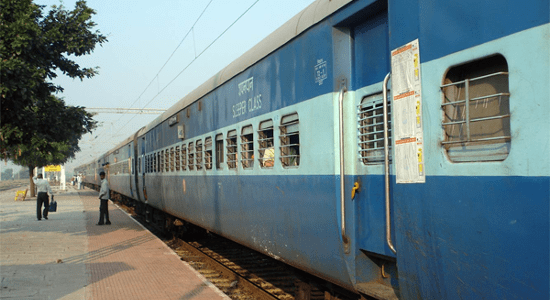Homecoming

Sanjay Talreja
June 3, 2013

I
The train was packed, but because Mr. Dalal arrived early, he managed to get a good window seat. Somehow, while waiting for the train to commence its journey, he must have fallen asleep because when he awoke, hot and sticky, he felt something hurting his left side. He found that he had been squeezed into a corner by a tall bony man who now sat pretending not to notice Mr. Dalal’s heavy-lidded look but stared blankly into space.
Standing between himself and the man was, Mr. Dalal assumed, the man’s wife. He could could feel her hot, moist breath on his neck and sense her stare telling him—almost insistently so—that he make way for her but he refused to give her the satisfaction of seeing him move.
A ghost from his memory appeared and went by in a flash. At one time, the thought of remaining seated while a woman waited standing would have shamed him into offering her his seat; maybe he would have even considered sharing a paan with her husband. But things had changed since that time. Now even wild horses could not make Mr. Dalal budge. No, the time for weakness and vacillation was over. The time had come to make a stand.
He chose, instead, to turn his neck towards the window and focus his eyes on the city that swept past behind him, and to watch it slide past at the speed of the ambling train. He was filled with an unknown pleasure as he left the city, perhaps for good; the sight of it sinking deeper into the mess that it had created for itself gave him a malicious, even sinful satisfaction.
The train sped up, clack-clacking, swaying slowly from side to side. Soon, he could not see much of the city apart from the glutinous mass of bodies that semed to fill virtually every inch of visible space. Mobs, that’s all this town is going to get now, he said to himself, mobs and fools like this one who is intent on making me move.
Everywhere there were people: apart from the hordes that had detrained at local stations and were now making their painful trudge home, there were those who lived on and by the railway tracks, eking out their existence in flimsy, ramshackle huts which would have taken only a single monsoon shower to topple them.
Mr. Dalal was shocked by what he saw, but even more troubled by how callous he had been that he had been totally blind to this devastation. How could so much have changed in the few months that he had been away? Or was it him who was looking at his old world with new eyes? This suburban rail corridor was part of his daily commute and much of what he was seeing now had just slid by in the past. Had he allowed himself to become so indifferent, Mr. Dalal wondered, that all this which so horrified him now, had been a tacitly accepted, if never spoken, part of his life?
By the tracks, what were private, even secretly unacknowledged acts for Mr. Dalal were now played about openly, shamelessly, he thought, before his very eyes. There, men bathed, furiously soaping parts of their bodies that Mr. Dalal would quiver to touch even in the solitude of his own bathroom; elsewhere, with their backs turned to the trains, men defecated, oblivious to the presence of the bloated pigs that greedily eyed the turds snaking out of their intestines; there, next to stagnant pools of dirty water, buzzing with flies and mosquitoes, women had somehow lit feeble dung fires, and were now rolling chapatis for hungry families that sat patiently waiting to be fed. And, amidst all the dirt and squalor and the appalling stench, were children—the only resource that this land of garbage (wasn’t that what Shirish had called it?) seemed to have in abundance. Millions of gaping mouths and bloated, unfed stomachs—children, millions and millions and more millions of them—yet, the children played.
As the train began to gather pace, and everything began to fade into a blur, Mr. Dalal’s eyes caught a last image—a man stretching his arms over his head and settling down comfortably on his charpoy, using his filthy lungi to shield his eyes. In the man’s last gesture, shutting out the world as it were, the sum total of everything that he had seen in the past few seconds came together for Mr. Dalal.
Not one of them had looked or even physically acknowledged the presence of the trains that roared past them. Perhaps, by averting their eyes from the millions that stared, gazed, examined, magnified every part of their anatomy, they preserved their privacy and remained intact as individuals with their own lives, their own secrets.
Disgusted, Mr. Dalal rolled the phlegm that had gathered in his throat into a ball and contemptuously spat it out of the window.
He turned back to the man who was leaning on him and firmly pushed him off his shoulder. The man looked as if he was about to argue but seeing the determined look on Mr. Dalal’s face caused him to change his mind. A few moments later the man left, muttering audibly to his wife about the harm that would come to ugly, old, middle-class men when they realised that the Indian people were not going to continue to take the treatment that was being meted out to them. Mr. Dalal made as if to get up, but the man had already retreated into the back of the compartment and was soon gone.
